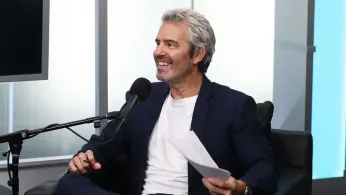
2 hours ago
Andy Cohen Candidly Shares Weight-Loss Journey Sparked by Bravo Reunion
READ TIME: 3 MIN.
On September 26, 2025, Andy Cohen—renowned television host and the creative force behind Bravo’s popular reality franchises—spoke candidly on NBC’s “Today” show about the personal turning point that led to his recent physical transformation. Cohen, an openly gay media icon, recounted that his appearance during the season two reunion of “The Valley,” filmed in May and aired in July, catalyzed a reevaluation of his health and body image after he felt he did not “look best” on camera .
“I couldn’t button my suits. It was bad,” Cohen confessed, reflecting on the discomfort and dissatisfaction he experienced while watching himself on screen. “Terrible. If you watch the Valley reunion from last season… I do not look my best. And it was after that that I was like, I got to get this together” .
Cohen revealed that following this experience, he began taking a weight-loss drug, a choice he made after much consideration and in consultation with his healthcare provider. While Cohen did not publicly name the specific medication, his transparency about seeking medical assistance for weight management is significant in an era where public figures, especially those from marginalized communities, often face heightened scrutiny regarding appearance and health .
The revelation comes amid broader public discourse about the use of FDA-approved weight-loss drugs, such as semaglutide-based medications, in the entertainment industry. Cohen’s decision to share his journey openly offers a nuanced perspective on body image, self-care, and health within the LGBTQ+ community and beyond .
For LGBTQ+ individuals, body image can be a particularly complex issue, as cultural expectations around appearance often intersect with the challenges of public visibility and representation. As one of the most prominent openly gay figures in television, Cohen’s willingness to discuss his struggles with self-image and his proactive approach to wellness carries weight beyond celebrity culture. His story serves as a reminder that even those at the pinnacle of success are not immune to insecurities or the societal pressures that shape perceptions of worth and beauty .
Health advocates and LGBTQ+ organizations have long emphasized the importance of mental wellbeing and self-acceptance alongside physical health. Cohen’s openness may encourage others within the community to seek support—whether medical, psychological, or social—without shame or fear of stigma. It also reignites important conversations around access to healthcare for LGBTQ+ people, who continue to experience disparities in medical treatment and outcomes .
Cohen’s experience highlights the unique pressures faced by those whose work places them constantly in the public eye, where every perceived flaw is subject to scrutiny and commentary. For LGBTQ+ public figures, these pressures are often compounded by the expectations of representation and the ongoing fight for inclusion and equality in media spaces .
The decision to discuss his weight-loss journey publicly, rather than conceal the use of medication, marks a shift in how celebrities engage with conversations around body image and self-improvement. Cohen’s candor aligns with a growing trend toward transparency and authenticity among LGBTQ+ and allied public figures who leverage their platforms to destigmatize mental health issues, promote body positivity, and advocate for holistic wellness .
The response to Cohen’s revelation has been largely supportive, with many fans and LGBTQ+ advocates commending his honesty and vulnerability. Social media platforms have seen a surge in discussions about the intersection of weight, health, and self-esteem, with users sharing their own experiences and expressing gratitude for Cohen’s example .
Industry observers note that while the entertainment sector has made strides in recent years toward broader and more inclusive representations of LGBTQ+ lives, ongoing dialogue about wellness, authenticity, and the impact of public scrutiny remains essential. Cohen’s story serves as both a personal narrative and a cultural touchstone—a reminder of the value of self-acceptance and the power of visibility in challenging outdated norms .
As conversations about health, body image, and LGBTQ+ representation continue to evolve, Andy Cohen’s openness offers encouragement to those navigating similar journeys—affirming that seeking help is a sign of strength, not weakness, and that every person’s path to wellness is valid.






